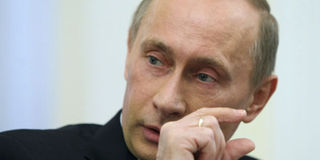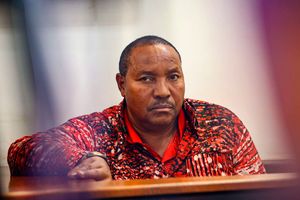Premium
Putin promises tough love as president

Russia’s Prime Minister Vladimir Putin said that Moscow was “very worried” by the eurozone crisis and expected the European Union to act quickly to avoid economic stagnation. Photo/FILE
Russia’s Vladimir Putin has said his likely second presidency will almost certainly look a lot like his first — based on “a love for the Motherland” and tough security and defence.
Russia’s powerful prime minister huddled with a group of Russian and Western analysts at a French restaurant outside Moscow in advance of next month’s parliamentary elections and the March presidential vote.
Putin had already solved Russia’s main political riddle by announcing his plans to swap jobs with President Dmitry Medvedev and return to the Kremlin after a 2000-2008 stint as head of state.
But the analysts tried to decipher the type of political system the former KGB agent planned to introduce for his second spell in power. Putin can conceivably remain president until 2024.
“Putin does not split in two. He is one person,” Putin said in response to a question about whether his second term would look much different from his first.
“There are basic things that are not subject to change, that will not change — a love for the Motherland, the push for results ... for increasing people’s fortune, and for internal and external security.”
Putin’s first term witnessed the state win control of all the major television stations and eliminate political parties through restrictive campaign laws.
The Kremlin quickly got rid of regional elections and tightened controls further in response to a deadly series of Islamist strikes such as the Beslan school hostage crisis of September 2004.
Moscow’s confrontation with the West meanwhile deepened over the US-led war in Iraq and eventually required Washington to introduce its famed “reset” of Russian relations, once Medvedev settled in as president, in 2009.
End the civil war
Putin defended all of those policies on Friday while conceding that the system he introduced was “not ideal”.
“The current model allowed us to end the civil war,” Putin said in reference to the North Caucasus fighting.
“Of course our system is not ideal. We know about the critical remarks regarding this structure — the tandem,” Putin said in reference to the term he and Medvedev often use to describe their joint rule.
“But I do not know if there are ideal political systems,” Putin added.
The tandem, meeting participants gathered, is in Russia to stay.
“I got the impression that Medvedev will be prime minister, and that he will have full authority,” Alexander Rahr of the German Council on Foreign Relations said after the three-hour-long dinner with Putin ended well after midnight.
“He did not agree with our report that Russia is in stagnation,” he said.
The biggest criticism facing both Putin and Medvedev is that they essentially decided the presidential election between them without ever giving voters a fair say.
The two old colleagues decided on Putin. But analysts note that even the less popular Medvedev would have almost certainly won in a country where state media dominate and the opposition is a fractured and enfeebled force.




